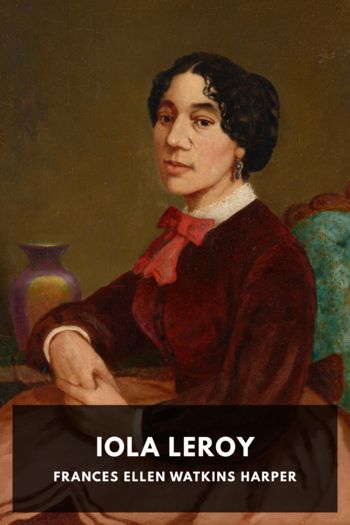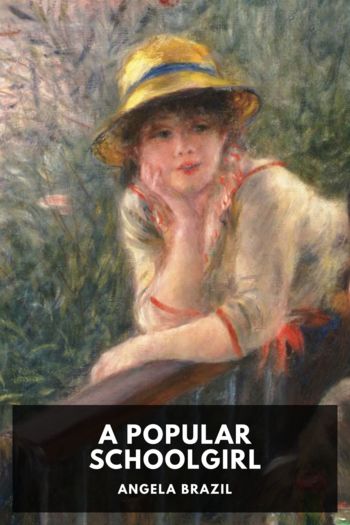Iola Leroy, Frances Ellen Watkins Harper [read aloud books .txt] 📗

- Author: Frances Ellen Watkins Harper
Book online «Iola Leroy, Frances Ellen Watkins Harper [read aloud books .txt] 📗». Author Frances Ellen Watkins Harper
“And I think,” said Rev. Carmicle, “that we are outgrowing them as fast as any other people would have done under the same conditions.”
“The negro,” replied Dr. Latrobe, “always has been and always will be an element of discord in our country.”
“What, then, is your remedy?” asked Dr. Gresham.
“I would eliminate him from the politics of the country.”
“As disfranchisement is a punishment for crime, is it just to punish a man before he transgresses the law?” asked Dr. Gresham.
“If,” said Dr. Latimer, “the negro is ignorant, poor, and clannish, let us remember that in part of our land it was once a crime to teach him to read. If he is poor, for ages he was forced to bend to unrequited toil. If he is clannish, society has segregated him to himself.”
“And even,” said Robert, “has given him a negro pew in your churches and a negro seat at your communion table.”
“Wisely, or unwisely,” said Dr. Gresham, “the Government has put the ballot in his hands. It is better to teach him to use that ballot aright than to intimidate him by violence or vitiate his vote by fraud.”
“Today,” said Dr. Latimer, “the negro is not plotting in beer-saloons against the peace and order of society. His fingers are not dripping with dynamite, neither is he spitting upon your flag, nor flaunting the red banner of anarchy in your face.”
“Power,” said Dr. Gresham, “naturally gravitates into the strongest hands. The class who have the best brain and most wealth can strike with the heaviest hand. I have too much faith in the inherent power of the white race to dread the competition of any other people under heaven.”
“I think you Northerners fail to do us justice,” said Dr. Latrobe. “The men into whose hands you put the ballot were our slaves, and we would rather die than submit to them. Look at the carpetbag governments the wicked policy of the Government inflicted upon us. It was only done to humiliate us.”
“Oh, no!” said Dr. Gresham, flushing, and rising to his feet. “We had no other alternative than putting the ballot in their hands.”
“I will not deny,” said Rev. Carmicle, “that we have made woeful mistakes, but with our antecedents it would have been miraculous if we had never committed any mistakes or made any blunders.”
“They were allies in war,” continued Dr. Gresham, “and I am sorry that we have not done more to protect them in peace.”
“Protect them in peace!” said Robert, bitterly. “What protection does the colored man receive from the hands of the Government? I know of no civilized country outside of America where men are still burned for real or supposed crimes.”
“Johnson,” said Dr. Gresham, compassionately, “it is impossible to have a policeman at the back of each colored man’s chair, and a squad of soldiers at each crossroad, to detect with certainty, and punish with celerity, each invasion of his rights. We tried provisional governments and found them a failure. It seemed like leaving our former allies to be mocked with the name of freedom and tortured with the essence of slavery. The ballot is our weapon of defense, and we gave it to them for theirs.”
“And there,” said Dr. Latrobe, emphatically, “is where you signally failed. We are numerically stronger in Congress today than when we went out. You made the law, but the administration of it is in our hands, and we are a unit.”
“But, Doctor,” said Rev. Carmicle, “you cannot willfully deprive the negro of a single right as a citizen without sending demoralization through your own ranks.”
“I think,” said Dr. Latrobe, “that we are right in suppressing the negro’s vote. This is a white man’s government, and a white man’s country. We own nineteen-twentieths of the land, and have about the same ratio of intelligence. I am a white man, and, right or wrong, I go with my race.”
“But, Doctor,” said Rev. Carmicle, “there are rights more sacred than the rights of property and superior intelligence.”
“What are they?” asked Dr. Latrobe.
“The rights of life and liberty,” replied Rev. Carmicle.
“That is true,” said Dr. Gresham; “and your Southern civilization will be inferior until you shall have placed protection to those rights at its base, not in theory but in fact.”
“But, Dr. Gresham, we have to live with these people, and the North is constantly irritating us by its criticisms.”
“The world,” said Dr. Gresham, “is fast becoming a vast whispering gallery, and lips once sealed can now state their own grievances and appeal to the conscience of the nation, and, as long as a sense of justice and mercy retains a hold upon the heart of our nation, you cannot practice violence and injustice without rousing a spirit of remonstrance. And if it were not so I would be ashamed of my country and of my race.”
“You speak,” said Dr. Latrobe, “as if we had wronged the negro by enslaving him and being unwilling to share citizenship with him. I think that slavery has been of incalculable value to the negro. It has lifted him out of barbarism and fetish worship, given him a language of civilization, and introduced him to the world’s best religion. Think what he was in Africa and what he is in America!”
“The negro,” said Dr. Gresham, thoughtfully, “is not the only branch of the human race which has been low down in the scale of civilization and freedom, and which has outgrown the measure of his chains. Slavery, polygamy, and human sacrifices have been practiced among Europeans in bygone days; and when Tyndall tells us that out of savages unable to count to the number of their fingers and speaking only a language of nouns and verbs, arise at length our Newtons and Shakespeares, I do not see that the negro could not have learned our language and received our religion without the intervention of ages of slavery.”
“If,” said Rev. Carmicle, “Mohammedanism, with its imperfect creed, is successful in gathering large numbers of negroes beneath the Crescent, could not a legitimate commerce and the teachings of a pure Christianity have





Comments (0)